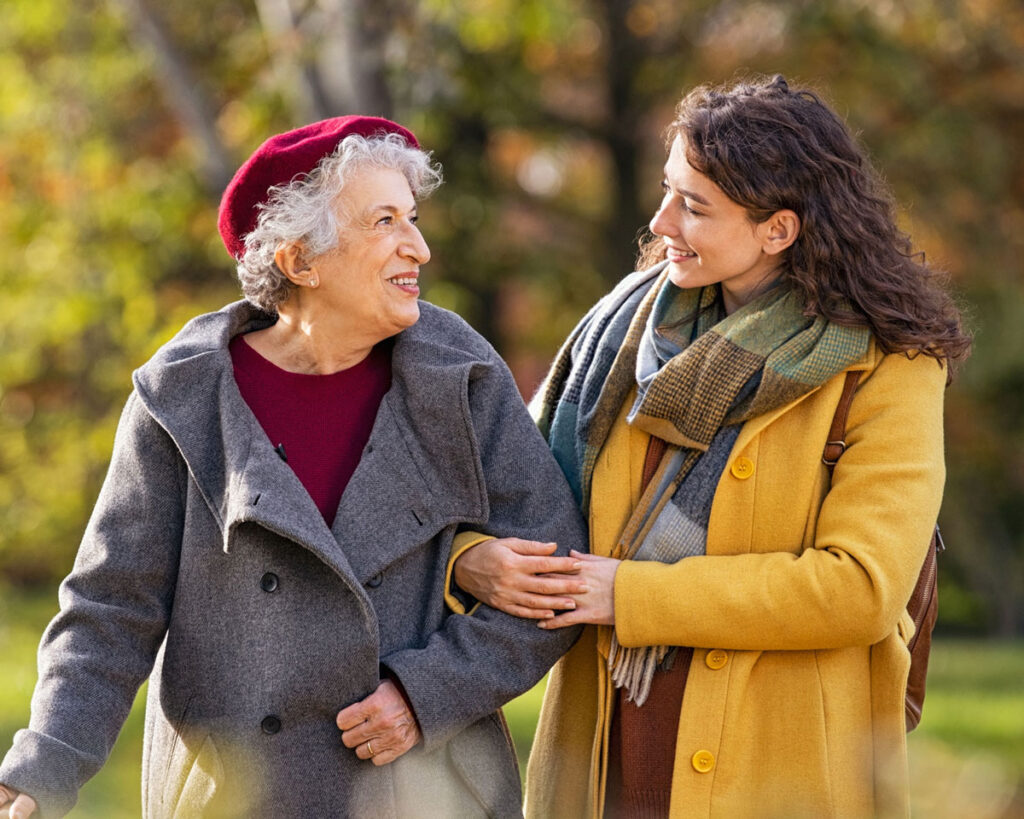Winter Safety Tips for Seniors

Why Cold Weather Poses Extra Risks to Your Aging Loved One
Winter can pose many safety hazards for everyone, but did you know that it’s especially challenging for seniors? For older adults with mobility and health issues, the cold weather poses a substantial risk of exacerbating existing health problems or causing new ones. However, with a little extra help, your loved one can remain comfortable and safe throughout the winter months.
As a provider of hospice and home health care in Utah, Dignity is very familiar with the additional challenges that the cold Utah weather can bring. So, here are our proven tips to help your loved one stay safe this winter.
8 Tips to Help Keep Your Loved One Safe This Winter
1. Keep their sidewalks, stairs, and driveways ice-free
Snowy and icy walkways are a fall hazard for senior citizens and, unfortunately, a common source of injuries. Fall injuries can cause significant injuries such as wrist and hip fractures, head trauma, and major lacerations. To avoid injury during the winter, senior citizens should wear shoes with good traction and stay inside until all pathways are clear. Snow removal companies offer this service if you or your loved one cannot keep pathways clear of snow and ice. Once inside the house, we recommend removing shoes to lower the risk of slipping on melted snow or ice.
2. Encourage them to dress appropriately for the cold weather
Cold temperatures can pose a significant problem for seniors because of the risk of frostbite and hypothermia. According to the National Institute on Aging, seniors are more at risk of losing body heat than younger adults. Make sure your loved one dresses warm and wears extra layers inside and outside, changing clothes if they get wet from the weather. Additional clothing articles may be necessary to stay warm inside, such as socks, slippers, long underwear, and a cap.
3. Ensure that the thermostat is set at a safe temperature
Sadly, living in a colder house can also lead to hypothermia. To help seniors stay safe from extreme temperatures, set the indoor temperature to 68-70° F. Consider installing a smart thermostat, so you can still monitor the temperature when you’re away. Close any vents, shut doors to rooms that aren’t in use, and keep basement doors closed. Keep curtains and blinds closed to make certain the house isn’t losing heat through windows. Ensuring that the house is a nice, warm temperature will keep your loved one safe.
4. Watch for warning signs of hypothermia
For the average person, it can be hard to pick up on the telltale signs of hypothermia. First, assess their environment. Is the house temperature too cold, and is your loved one incorrectly dressed for the cold weather? Another way to watch for hypothermia is to observe your loved one for any trouble with balance or changing speech patterns. Early signs of hypothermia include pale skin, cold feet and hands, a swollen face, drowsiness, and shivering.
5. Monitor any health issues
Another reason seniors can be more susceptible to cold temperatures is health issues. This is because some health issues make it harder for seniors to maintain their body heat properly. Those who suffer from limited movement, such as those with Parkinson’s disease or arthritis, can make it harder to use a blanket or put on extra clothes. Diabetes restricts blood from moving throughout the body to stay warm. Older adults with thyroid problems often struggle to maintain a proper body temperature, and memory loss can make it challenging to remember to dress appropriately. If your loved one cannot effectively monitor their health issues, extra in-home assistance during the winter is recommended.
6. Stay on top of car maintenance and transportation
Winter weather poses many transportation risks for anyone, especially for seniors who spend less time behind the wheel and often have delayed reflexes. If your loved one still drives, make sure you help them address any car issues before winter hits, such as checking the battery, oil, and windshield wipers. Ensure that their car has proper tires to handle the snowy roads. Encourage your loved one to stay home if the roads are snowy and keep extra supplies on hand to prevent unsafe trips to the store. If your loved one doesn’t drive, arrange appropriate and reliable transportation for them during winter.
7. Encourage them to eat a healthy diet
Eating a well-balanced diet full of fruits and vegetables will help keep your loved one healthy throughout the winter. Diets should be supplemented with additional vitamin D supplements during the dark, cold months to help avoid issues such as depression, cognitive decline, osteoporosis, and more. While healthy eating for seniors is essential year-round, it’s beneficial during the winter for helping to minimize health issues and reduce illnesses.
8. Stay in touch
Keeping the lines of communication open is perhaps the biggest safety tip during the winter season. Check on your loved one often, and encourage them to contact you frequently. Let them know that they can come to you for any help. If you live further away or cannot be available as often as you would like, know that there are many resources to assist you and your loved one.
For Extra Help, Consider Home Health Care Services in Utah
It’s okay to ask for help during the challenging winter months. If your loved one needs assistance around the house this upcoming season, Dignity provides home health care for Utah’s senior citizens, allowing them to stay safe and healthy. We are a Utah home health company with licensed healthcare professionals that can provide aid with a variety of tasks, such as daily living assistance, in-home medical care, medication reminders, meal planning and preparation, and much more. You’ll have peace of mind knowing that your loved one will have additional companionship and is in good hands with our home health care services. For a free consultation for home health care in Utah, contact Dignity today.
